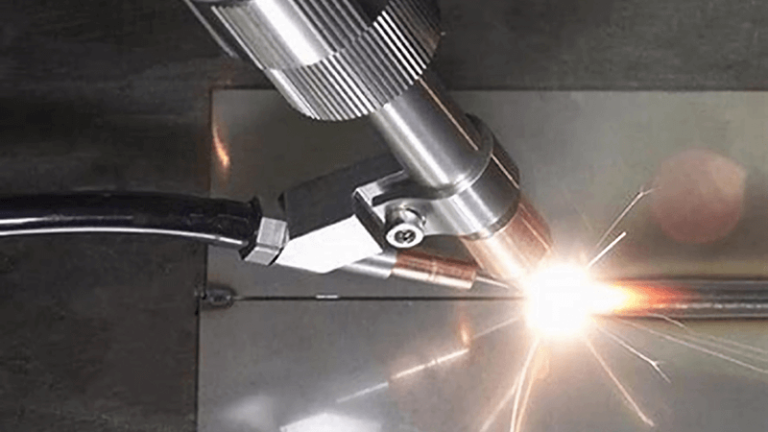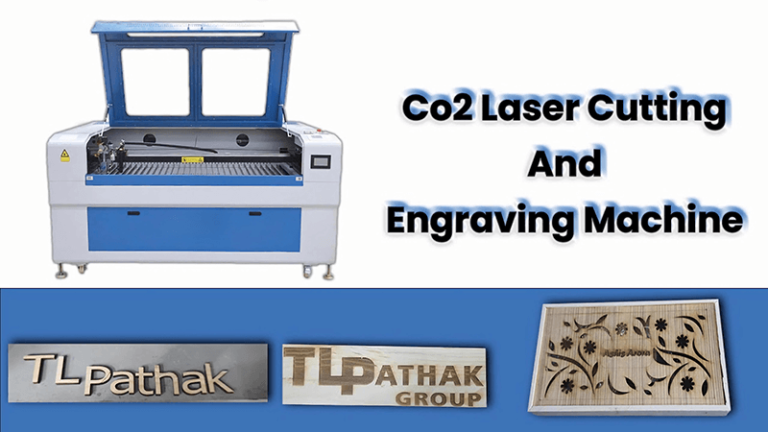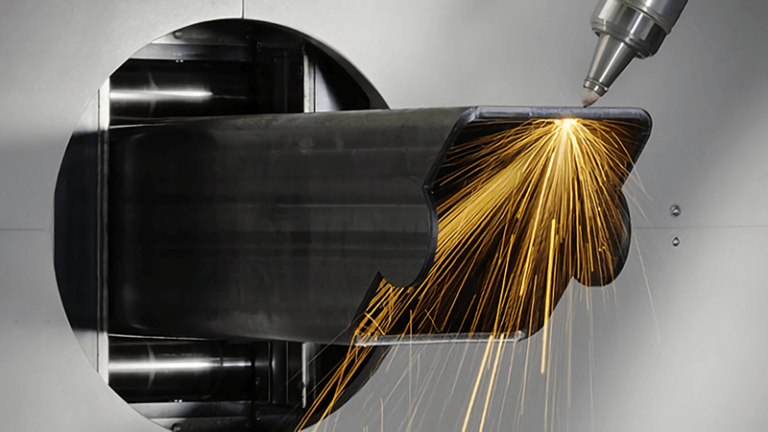
Ever wondered how some industries manage to maintain precision, aesthetics, and durability all at once? The secret often lies in laser engraving. I know what you’re thinking: isn’t engraving old-school? Not anymore. Today’s laser engraving technology has transformed industries, delivering unmatched precision and versatility.
Laser engraving on metals has become essential across sectors, from automotive to medical devices. It’s precise, fast, and eco-friendly. Plus, it ensures your brand or components leave a lasting mark—literally.
But wait, there’s more to this fascinating technology. Let's dive into the details and explore where it’s making a difference.
What Industries Benefit Most from Laser Engraving?
Manufacturing and Industrial Tooling
First, let’s talk tools. Factories can’t survive without engraved tools for identification and durability. Whether it’s a wrench or a drill bit, engraving ensures every tool is accounted for.
Need proof? Look at the engraved serial numbers on industrial-grade tools—they’re built to withstand years of wear and tear.
Industrial Marking
In industrial settings, laser engraving is essential for marking tools, machinery, and components. This includes:
- Serial Numbers and Barcodes: Ensuring traceability and compliance with industry standards.
- Logos and Branding: Enhancing product recognition and marketing through engraved logos on various metal products.
The durability of laser markings makes them resistant to wear and corrosion, which is crucial in demanding environments.

Custom Metal Tags
Laser engraving is commonly employed to create custom metal tags for pets, equipment, or promotional items. These tags can include names, contact information, or specific designs, enhancing identification and personalization.
Awards and Trophies
Laser engraving is popular for personalizing awards and trophies made from metals like brass or stainless steel. Engraved text or logos add a professional touch to these items, making them suitable for recognition events.
Electronics and Consumer Products
Ever flipped your phone and noticed that tiny logo or serial number? That’s laser engraving at its finest. Tech companies love this method because it’s precise and leaves no room for error.
Laptops, chargers, and even headphones use this technique. Brands trust it to uphold their image and product traceability.
Electronics Manufacturing
In electronics, laser engraving is used for marking printed circuit boards (PCBs) and electronic components. This process ensures that markings are precise and durable without damaging sensitive parts. Laser engravings can include identification numbers, logos, and other vital information necessary for product assembly and tracking.
Laser engraving is frequently used for engraving custom jewelry pieces.True
Laser engraving enables intricate designs and personal messages on jewelry, making it ideal for customization.
Laser engraving is unsuitable for marking medical devices due to lack of precision.False
Laser engraving is highly precise and is the preferred method for marking medical devices, ensuring compliance and durability.
How Is Laser Engraving Revolutionizing Jewelry and Medicine?
Jewelry and Personalization
Who doesn’t love custom jewelry? Laser engraving gives jewelers the power to create intricate designs and custom messages on rings, bracelets, and pendants. It’s a mix of art and technology.
Customers can now get their initials or meaningful symbols engraved in minutes.
Custom Engraved Jewelry
Laser engraving is widely used to personalize jewelry items, such as rings, bracelets, and pendants. This process allows for intricate designs, initials, or messages to be engraved with high precision. The permanence of laser engravings ensures that these personalized touches remain intact over time, making them ideal for gifts and keepsakes.
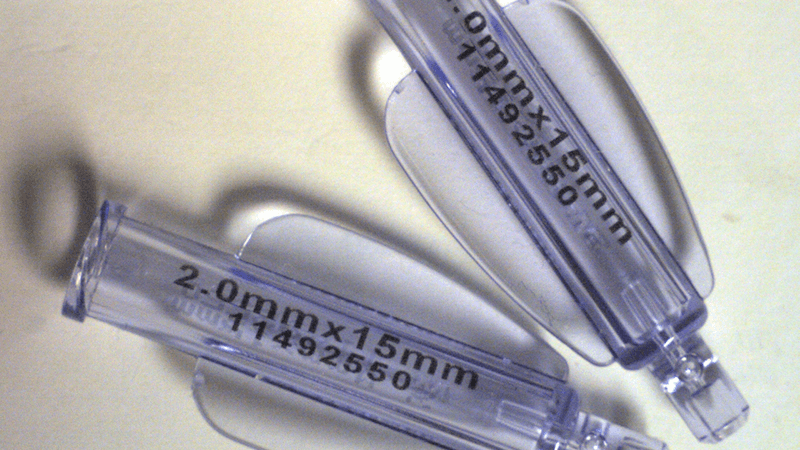
Medical Devices
Precision is life-saving in the medical world. From surgical instruments to implants, every device needs proper labeling for compliance. Laser engraving is the go-to method for durable, corrosion-resistant markings.
In fact, regulatory bodies like the FDA often require such permanent markings.
Medical Instruments
Laser engraving is critical in the medical field for marking surgical instruments and devices. This includes engraving serial numbers, barcodes, and brand logos, which are vital for traceability and regulatory compliance. The non-contact nature of laser engraving preserves the integrity of the instruments while providing clear and permanent markings.
What About Aerospace, Defense, and Automotive?
Aerospace and Defense
High precision is a must in these industries. Laser engraving ensures traceability and reliability for aircraft components and military equipment.
For example, critical parts of an aircraft often bear engraved serial numbers that endure extreme conditions.
In the aerospace industry, laser engraving is used to mark critical components with identification numbers or specifications. The high precision of laser technology ensures that these markings meet strict industry standards without compromising the structural integrity of the parts.
Automotive Industry
VIN codes, dashboard components, and gear labels—all these rely on laser engraving. Its speed and precision make it irreplaceable in high-volume automotive manufacturing.
Aerospace companies avoid using laser engraving for components due to high costs.False
Aerospace industries rely on laser engraving for precision and durability in marking components, despite its cost-effectiveness.
Stainless steel is a popular choice for laser engraving due to its corrosion resistance.True
Stainless steel’s strength and resistance to corrosion make it a common material for laser engraving.
Why Choose Laser Engraving for Metal?
-
Precision: Laser engraving provides high accuracy, allowing for intricate designs that are difficult to achieve with traditional methods.
-
Durability: Marks created by laser engraving are permanent and resistant to wear, ensuring long-lasting visibility.
-
Versatility: The technology can be applied to various metals including stainless steel, aluminum, brass, copper, titanium, and more.
-
Efficiency: Laser engraving is a fast process that can handle both small-scale custom jobs and large production runs effectively.
-
Environmentally Friendly: Laser engraving eliminates the need for consumables or chemicals. It’s clean, efficient, and aligns perfectly with sustainability goals.
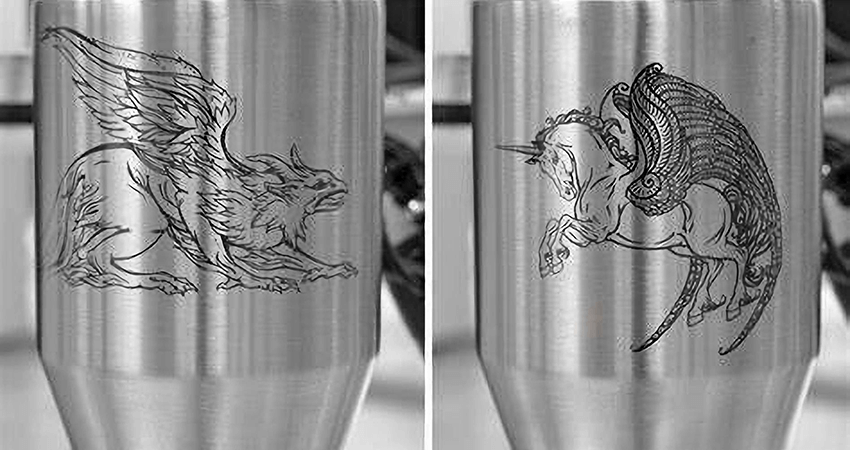
Commonly Engraved Metals
Laser Engraving Stainless Steel
Known for its strength and corrosion resistance, stainless steel is a favorite in tools and medical devices.
Parameter Settings for Laser Engraving on Stainless Steel
| Parameter | Recommended Range | Details and Tips |
|---|---|---|
| Laser Power | 80–180W | Adjust based on the thickness and type of stainless steel. Thicker materials may require higher power. |
| Engraving Speed | 0–1000 mm/s | Start with a lower speed and adjust as needed. Higher speeds may reduce detail, while slower speeds can affect efficiency. |
| Frequency | ~100 kHz | Higher frequency reduces engraving depth, making it suitable for surface detailing. |
| Focus Position | Offset by 2–3 mm | Slightly defocusing can improve engraving results. Test for optimal adjustment. |
| Power Ratio | Lower for black engraving | Reduce power ratio and increase speed when engraving black for better contrast and clarity. |
| Filling Method | Adjust based on font size | For smaller fonts, increase the density to improve visibility. |
| Corner Speed | Adjust for precision | Fine-tune corner speed and acceleration to balance between engraving precision and efficiency. |
Additional Tips
- Testing and Optimization: It’s important to perform multiple trials with different parameter combinations to identify the most suitable settings for your specific project.
- Engraving Depth: Shallower engraving is often sufficient for surface marking, while deeper engraving may require adjustments in power and speed.
- Material Variations: Different stainless steel grades may react differently, so adjustments may be necessary.
By following these recommendations and experimenting with parameter settings, you can achieve high-quality engraving results on stainless steel.
Laser Engraving Aluminum
Lightweight but versatile, aluminum shines in the electronics and automotive sectors.
The optimal parameter settings for fiber laser engraving aluminum can vary depending on the machine model, type of aluminum, and specific processing requirements.
Key parameters and recommendations:
| Parameter | Recommended Range | Notes |
|---|---|---|
| Laser Power | 30W–100W | - 30W–50W: For thin aluminum or surface marking. |
| - 50W–100W: For deeper engraving. | ||
| Laser Wavelength | 1064nm | Suitable for most aluminum materials. |
| Pulse Width | 1ns–400ns | Wider pulse widths help achieve greater engraving depth. |
| Frequency | 1kHz–2000kHz | Lower frequencies are ideal for deeper engraving. |
| Engraving Speed | 500mm/s–7000mm/s | Higher speeds reduce depth; adjust based on requirements. |
| Defocus Distance | -3mm | Provides optimal engraving results. |
For specific aluminum types and applications, you may need to refine these settings further based on testing and the characteristics of the laser engraving machine being used.
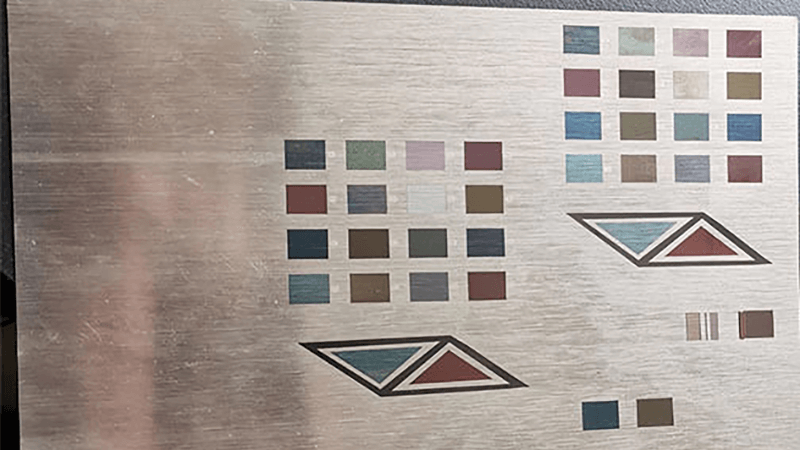
Laser Engraving Titanium
Aerospace and medical fields love titanium for its strength-to-weight ratio and biocompatibility.
Laser Marking Parameters for Titanium Alloy
| Parameter | Details |
|---|---|
| Laser Wavelength | 1064 nm, suitable for titanium alloy. |
| Laser Power | Around 50W, adjusted based on marking depth and speed requirements. |
| Marking Speed | ≤7000 mm/s, adjustable per equipment model and material properties. |
| Marking Depth | 0.01–1 mm, depending on laser power and material characteristics. |
| Minimum Line Width | 0.015 mm, suitable for detailed and precise marking. |
| Scanning Speed | Influences quality and efficiency; adjustable based on material and setup. |
| Laser Focal Point | Critical for ensuring optimal engraving results. |
| Repeat Precision | ±0.001 mm, ensuring accurate and consistent marking placement. |
Other Parameters
- Operating Environment: -5 to 35°C, ensuring proper equipment function.
- Cooling Method : Water cooling to stabilize performance and prolong equipment lifespan.
Key Considerations
- Surface Preparation: Clean and pre-treat the titanium alloy for optimal results.
- Parameter Optimization: Adjust settings to avoid material damage or undesirable outcomes.
- Regular Maintenance: Routine maintenance ensures proper functioning and longevity of equipment.
Aluminum is rarely used for laser engraving because it damages the material.False
Aluminum is lightweight and versatile, making it ideal for laser engraving in electronics and automotive applications.
Laser engraving is eco-friendly as it eliminates the need for consumables or chemicals.True
Laser engraving is environmentally friendly, aligning with sustainability goals by avoiding consumables or harmful chemicals.
Choosing the Right Laser Engraving Machine
At Kirin Laser, we recommend fiber laser engraving machines. They’re fast, precise, and handle metals effortlessly. Whether it’s stainless steel or titanium, our machines deliver unmatched results.
Want to know more? Check out our range of engraving solutions.
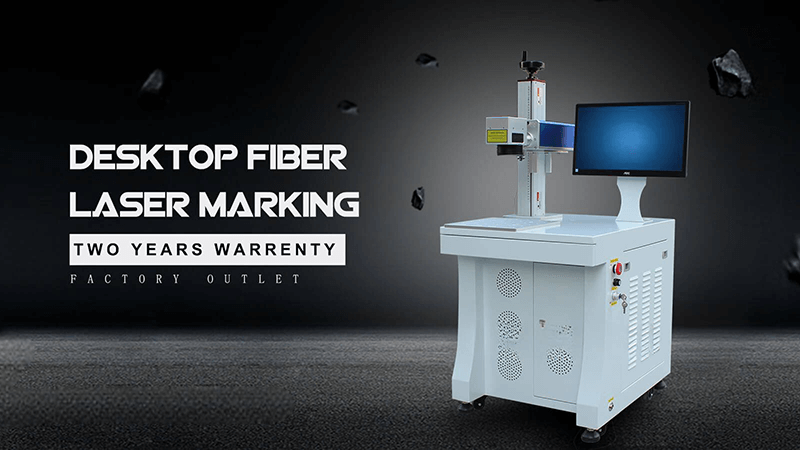
Conclusion
From tools to medical devices, laser engraving on metals is transforming industries. It’s precise, eco-friendly, and built for the future.
Let’s make your products stand out—explore our top-selling laser engraving machines today. Contact us to get the perfect laser machines.
References:
- "Combining Cutting and Engraving: The Versatility of Laser Machines", from Kirin Laser.
- "Exploring the World of Laser Engravings: A Beginner’s Guide", from Kirin Laser.
- "A Complete Guide of Mopa Laser Marking Machine," from Kirin Laser.
- "Top Benefits of Using Laser Marking on Metal", from Kirin Laser.
- "Top Applications of Laser Marking Engraving Machines in Manufacturing", from Kirin Laser.
- "Top 5 Applications of Laser Machine Engraving in Industry", from Kirin Laser.
- "Top Applications and Benefits of Laser Engraving Machines", from The Earth Awards.
- "Metal Engraving: Overview of Laser Engraving on Metal", from Wayken.


